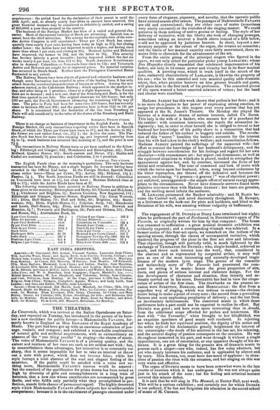The engagement of M. DIIPREZ at Drury Lane terminated last
nights when he performed the part of Ferdinand, in DONIZETTIs opera of The Favorite, as originally written for him by that composer. The house was crammed to suffocation : a great musical dramatic exhibition was evidently expected ; and a corresponding triumph was achieved. In a former notice of this four-act opera, we remarked on the tedium of the opening scenes, through the excess of accompanied recitative, which. rendered the progress of the piece in the first act slow and laborious. That objection, though still partially valid, is much lightened by the exchange of TEMPLETON for DUPREZ ; who, single-handed, achieved so much, and threw such interest into the work, that, considered in the abstract and as represented by congenial artists, it may well pass as one of the most interesting and naturally-developed tragic dramas of the modern lyric stage. The genius of the romantic- and melancholy story of The Favorite had penetrated the com- poser io setting it to music: hence the great proportion of airs, duets, and pieces of serious interest and elaborate design. For the due development of character and situation, thus intently and se- riously carried out in his score, DONIZETTI has had in view the coope- ration of artists of the first class. The drawbacks on the present oc- casion were STRETTON, BORRANI, and HORNCASTLE: the first from a superfine way of singing, which was tedious to excess—the obvious desire being to make a point of every note ; the second from a prevailing flatness and most unpleasiug peculiarity of delivery ; and the last from an involuntary ludicrousness. The concerted music is which these performers bore a part could not be expected to realize its effect. But DUPHEZ was great ; and here even more interesting than in Arnold, from the additional scope afforded for pathos and tenderness. His duet with " the Favourite," when brought to her blindfolded, was an exquisite specimen of good music well rendered. In rejecting her when he finds her equivocal position, the dignity of his action and the noble style of his declamation greatly heightened the interest of the catastrophe—the death of his mistress in the last act, his relenting, and the natural display of passion consequent on the occasion. He was throughout immersed in his part, and went through it 'without a single impertinence, one act of ostentation, or any apparent thought of his au- dience. It is a great thing for the present sera of dramatic music to possess such a singer—one who, indeed, has few noisy admirers, but yet who deeply interests his audience, and is applauded by silence and by tears. Miss ROMER, too, must have due meed of applause : in situa- tions of passion she rises with the occasion, and her singing on this was very warm and effective.
The organ of Dureiz seems to have been somewhat worn in the late course of exertion which it has undergone. He was not always quite just in his attack of the note ; but his feeling and artistical manner covered this minute defect.
It is said that he will sing in The Messiah, at Exeter Hall, next week. This will be a curious exhibition ; and certainly one for which DUPBEZ is not unfitted, if he has not forgotten his education in the sacred school of music of M. County,


























 Previous page
Previous page